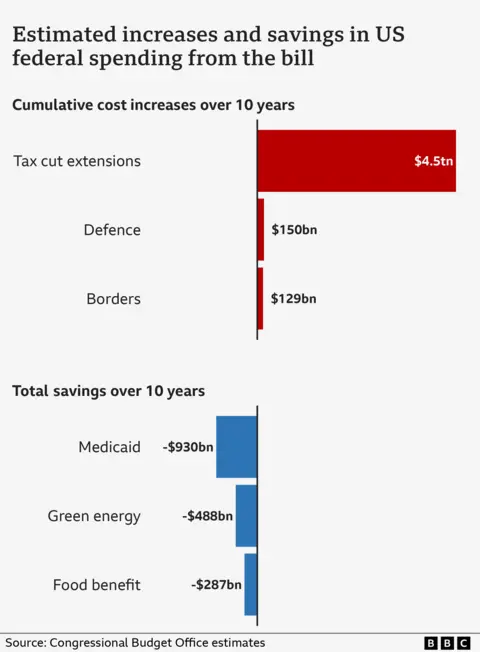Trump's mega-bill heads for final vote in overnight US House session
BBC News, Washington DC
The US House of Representatives is working through the night as Donald Trump and his allies try to pressurise holdouts in the president’s own Republican Party to back his mega-bill on tax and spending in a final vote.
The sprawling legislation, which could define Trump’s second term in office, passed a key procedural vote after 03:00 EDT (07:00 GMT).
Trump’s bill has been opposed not only by opposition Democrats, but by a handful of Republicans who criticise its potential impact on national finances, healthcare and other issues.
The bill ground through the Senate earlier this week in another overnight session. Trump has given a deadline of Friday for a final version to reach him for sign-off.
Both chambers of Congress are controlled by Trump’s Republicans, but within the party several factions are fighting over key policies in the lengthy legislation.
The House, or lower chamber, approved an earlier version of the bill in May with a margin of just one vote, and this bill, with new amendments that have frustrated some Republicans, must now be reconciled with the Senate version.
The bill narrowly cleared the Senate, or upper chamber, on Tuesday. Vice-President JD Vance cast a tie-breaking vote after more than 24 hours of debate and resistance from some Republican senators.
It has so far proven equally tricky for Trump’s allies to pass the bill through the House.
After about seven hours of wrangling that led to most lawmakers clearing from the chamber on Wednesday, House Speaker Mike Johnson scheduled a vote on the rule – a procedural vote that allows the legislation to be brought to the floor for a full vote.
This hurdle was ultimately cleared several hours later, and was seen as a signal that Republicans might have the support they needed after all.
The president has been very involved in attempting to persuade the holdouts and held several meetings at the White House on Wednesday in hopes of winning them over.
On Wednesday, he took to social media to apply further pressure, saying that the “House is ready to vote tonight”. He added that Republicans are “united” to deliver “massive growth”.
Ralph Norman, a House Republican from South Carolina, attended one of the meetings but was not persuaded, further fuelling the overnight jeopardy for Trump and his allies.
“There won’t be any vote until we can satisfy everybody,” Norman said, adding he believes there are about 25 other Republicans who are currently opposed to it. The chamber can only lose about three Republicans to pass the measure.
“I got problems with this bill,” he said. “I got trouble with all of it.”
Sticking points have included the question of how much the bill will add to the US national deficit, and how deeply it will cut healthcare and other social programmes.
During previous signs of rebellion against Trump at Congress, Republican lawmakers have ultimately fallen in line, and they now look likely to do so in the final House vote.
What is at stake this time is the defining piece of legislation for Trump’s second term. But several factions have stood in its way as the bill has worked through Congress.
The deficit hawks
The Congressional Budget Office (CBO) estimated that the version of the bill that was passed on Tuesday by the Senate could add $3.3tn (£2.4tn) to the US national deficit over the next 10 years. That compares with $2.8tn that could be added by the earlier version that was narrowly passed by the House.
The deficit means the difference between what the US government spends and the revenue it receives.
This outraged the fiscal hawks in the conservative House Freedom Caucus, who have threatened to tank the bill.
Many of them have echoed claims made by Elon Musk, Trump’s former adviser and campaign donor, who has repeatedly lashed out at lawmakers for considering a bill that will ultimately add to US national debt.
Shortly after the Senate passed the bill, Texas congressman Chip Roy, of the ultraconservative House Freedom Caucus, was quick to signal his frustration.
He said the odds of meeting Trump’s 4 July deadline had lengthened.
 Getty Images
Getty ImagesFreedom Caucus chairman Andy Harris of Tennessee told Fox News that Musk was right to say the US cannot sustain these deficits. “He understands finances, he understands debts and deficits, and we have to make further progress.”
On Tuesday, Conservative congressman Andy Ogles went as far as to file an amendment that would completely replace the Senate version of the bill, which he called a “dud”, with the original House-approved one.
Ohio Republican Warren Davison posted on X: “Promising someone else will cut spending in the future does not cut spending.”

The Medicaid guardians
Representatives from poorer districts have been worried about the Senate version of the bill harming their constituents, which could also hurt them at the polls in 2026.
According to the Hill, six Republicans were planning at one point to vote down the bill due to concerns about cuts to key provisions, including cuts to medical coverage.
Some of the critical Republicans have attacked the Senate’s more aggressive cuts to Medicaid, the healthcare programme relied upon by millions of low-income Americans.
“I’ve been clear from the start that I will not support a final reconciliation bill that makes harmful cuts to Medicaid, puts critical funding at risk, or threatens the stability of healthcare providers,” said congressman David Valadao, who represents a swing district in California.
This echoed the criticism of opposition House Democrats, whose leader, Hakeem Jeffries, posted a picture of himself on Wednesday to Instagram, holding a baseball bat and vowing to “keep the pressure on Trump’s One Big Ugly Bill”.
Other Republicans have signalled a willingness to compromise. Randy Fine, from Florida, told the BBC he had frustrations with the Senate version of the bill, but that he would vote it through the House because “we can’t let the perfect be the enemy of the good”.
House Republicans had wrestled over how much to cut Medicaid and food subsidies in the initial version their chamber passed. They needed the bill to reduce spending, in order to offset lost revenue from the tax cuts contained in the legislation.
The Senate made steeper cuts to both areas in the version passed on Tuesday.
Changes to Medicaid and the Affordable Care Act (better known as Obamacare) in the Senate’s bill would see roughly 12 million Americans lose health insurance by 2034, according to a CBO report published on Saturday.
Under the version originally passed by the House, a smaller number of 11 million Americans would have had their coverage stripped, according to the CBO.
 Hakeem Jeffries/Instagram
Hakeem Jeffries/InstagramThe state tax (Salt) objectors
The bill also deals with the question of how much taxpayers can deduct from the amount they pay in federal taxes, based on how much they pay in state and local taxes (Salt). This, too, has become a controversial issue.
There is currently a $10,000 cap, which expires this year. Both the Senate and House have approved increasing this to $40,000.
But in the Senate-approved version, the cap would return to $10,000 after five years. This change could pose a problem for some House Republicans.

Follow the twists and turns of Trump’s second term with North America correspondent Anthony Zurcher’s weekly US Politics Unspun newsletter. Readers in the UK can sign up here. Those outside the UK can sign up here.





